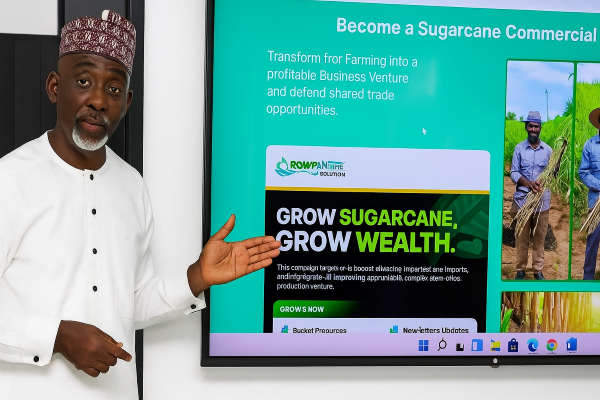FG Launches Sugarcane Outgrower Programme to Boost Local Production, Cut Imports

In a major step toward achieving self-sufficiency in sugar production, the Federal Government of Nigeria has inaugurated the Sugarcane Outgrower Development Programme (SODP) — a flagship initiative aimed at transforming the nation’s sugar industry through enhanced local production, job creation, and value chain integration.
The programme, spearheaded by the National Sugar Development Council (NSDC), is a central component of the Nigeria Sugar Master Plan II (NSMP II) and represents a renewed commitment to reduce dependence on sugar imports while driving inclusive growth across rural communities.
Speaking at the launch in Abuja, the Executive Secretary of NSDC, Mr. Kamar Bakrin, described the initiative as a “transformational blueprint” for the nation’s sugar economy.
“The SODP is designed to boost local sugarcane cultivation, reduce Nigeria’s dependence on imports, and integrate outgrower farmers into the industry’s supply chain,” Bakrin said. “It will complement existing estates and close the national supply gap.”
A New Model for Inclusive Industrial Growth
The Sugarcane Outgrower Development Programme represents Nigeria’s first structured framework to formally integrate smallholder and commercial farmers into the national sugar value chain.
The programme is expected to create thousands of direct and indirect jobs, enhance farmer productivity, and expand access to modern agronomic practices while linking outgrowers to sugar estates through guaranteed offtake arrangements.
Under the initiative, participating farmers will receive:
- Access to improved seedcane and farm inputs
- Technical support and agronomic training
- Guaranteed offtake agreements with sugar processors
- Capacity-building programmes in sustainable land and water management
“This campaign targets all stakeholders—from large-scale operators to smallholder farmers—ensuring everyone has a fair opportunity to contribute to Nigeria’s drive for sugar self-sufficiency,” Bakrin noted.
The SODP also aligns with the government’s broader economic diversification strategy, strengthening agro-industrial linkages, enhancing food security, and reducing foreign exchange outflows from sugar imports currently valued at over $500 million annually.
Structured Participation for Maximum Impact
According to Mrs. Lade Offurum, NSDC’s Head of Out-Grower Management, the programme is designed to ensure balanced participation across all farming categories.
She explained that the SODP targets:
- Commercial farmers managing between 50–500 hectares,
- Cooperatives managing 30–50 hectares, and
- Smallholder clusters cultivating at least 30 hectares collectively.
“This structure ensures inclusivity, efficient aggregation, and streamlined management of smallholder production systems,” Offurum said. “It creates operational efficiency while promoting community-based participation.”
The programme’s phased implementation will prioritise states with established sugar development projects under the Nigeria Sugar Master Plan (NSMP) — including Kwara, Niger, Kogi, Nasarawa, Taraba, Adamawa, and Ogun States — with plans to expand nationwide.
Driving Sustainability and Environmental Stewardship
Beyond productivity, the SODP places a strong emphasis on sustainability and climate-smart agriculture.
The NSDC plans to embed environmentally responsible practices in irrigation, land clearing, and fertilizer use, ensuring long-term soil health and water conservation.
This approach supports the United Nations’ Sustainable Development Goals (SDGs), particularly Goal 2 (Zero Hunger) and Goal 8 (Decent Work and Economic Growth), while aligning with Nigeria’s commitments to the Paris Climate Agreement.
BRANDECONOMY ANALYSIS: Nigeria’s Sweet Spot in the Global Sugar Economy
The inauguration of the Sugarcane Outgrower Development Programme marks a significant pivot toward industrial self-reliance and agro-industrial competitiveness in Nigeria’s sugar sector.
BRANDECONOMY analysis highlights four key dimensions that could define its long-term success:
1. Economic Impact and Value Addition
Nigeria’s sugar import bill remains one of the largest among food commodities. A robust outgrower model could save hundreds of millions of dollars annually, stimulate local refining, and create industrial linkages across ethanol production, confectionery, and bioenergy.
2. Empowering the Rural Economy
By targeting smallholder farmers and cooperatives, the SODP could inject liquidity into rural economies, foster agricultural entrepreneurship, and strengthen local agribusiness ecosystems.
3. Strengthening Backward Integration Policy (BIP)
The programme directly complements the NSDC’s Backward Integration Policy—encouraging investors like Dangote Sugar Refinery, BUA Sugar, and Flour Mills of Nigeria to expand plantations and outgrower partnerships, thus bridging raw material supply gaps.
4. Export and Regional Trade Potential
As Africa’s largest consumer market under the AfCFTA (African Continental Free Trade Area), Nigeria has the potential to become a regional sugar production hub, exporting refined products and ethanol derivatives to neighbouring West African countries.
The Road Ahead: From Policy to Production
The launch of the SODP signals a renewed policy focus on transforming agriculture into an industrial powerhouse.
But its success will depend on:
- Consistent funding,
- Transparent implementation, and
- Effective monitoring and evaluation frameworks.
If executed effectively, the programme could elevate Nigeria from being a net sugar importer to a regional production leader, creating a more resilient and self-sustaining economy powered by local farmers and industries.











